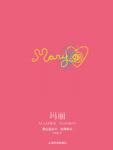Chapter 1 foreword
The Russian title of the novel at hand, Mashenka—a secondary nickname for "Maria"—is almost impossible to transliterate reasonably (the accent is on the first on the same syllable as the "a" in "ask", plus a palatalized "n" as in "mignon").In searching for an appropriate alternative name (Mariette? Or May?), I settled on (Mary), which seemed to best match the natural innocence of Russian book titles.
Mashenka is my first novel.I began writing this book in Berlin, shortly after my marriage in the spring of 1925, and finished it early the following year, published by an émigré book company (Slofer Publishing Company, Berlin, 1926) .The German edition came out two years later (Ulstein Publishing Company, Berlin, 1928), but I have not read it.Otherwise, there was no translation for an unforgettable period of forty-five years.
It is well known that the first-time writer has a strong tendency to incorporate his own experiences, and he puts himself or a substitute in his first novel not so much because of the appeal of ready-made subject matter as It is to get rid of the ego so that we can go on to do better things lightly.This is one of the very few general rules that I accept.It is impossible for readers of my Speak, Memory (started in the 1940s) not to notice certain similarities between my recollections and those of Ganin.His Marie and my Tamara are twin sisters, both have ancestral boulevards, the Olegezh River flows in both books, and today's photo of Rozh Stevino's mansion - very beautifully reproduced in On the cover of the Penguin edition ("Speak, Memory," 1969)—it's literally a photograph of the colonnaded house in "Vorsklesinsk" in the novel.When I wrote the twelfth chapter of my autobiography a quarter of a century later, I did not look at Mashenka; and when I do look it up now, I am fascinated by the fact that despite the added fiction ( Fights with village hooligans, for example, or a tryst with fireflies in an unnamed town), in romanticized writing contains a stronger essence of personal reality than in the scrupulously faithful narrative of the autobiographical author.At first I wondered how it was possible to retain the thrill of my own experience while having so much difficulty in plotting and ostentatiously fictional characters (even clumsily making two characters appear in Mary's letters) The heart, and the pleasing atmosphere; I find it especially hard to believe that imitation in literature can compete with pure truth.But the explanation is actually very simple: Compared with me in "Speak, Memory", Ganin is three times closer to his past than I am.
Because of the extraordinary remoteness of Russia, and because nostalgia remains throughout life your obsessive companion, whose heart-rending eccentricities I have grown accustomed to suffer in public, I admit to my emotional indifference to this debut novel. Strongly attached and not at all embarrassed by it.Its blemishes are the product of ignorance and inexperience, and any reviewer could easily list them in jest, but to me (the only judge in the case and on the court), several of them The scenes offset all the blemishes (convalescence, barn concert, boating); if I had thought of it at the time, I would have moved these scenes in their entirety into later productions.From the outset of my collaboration with Mr. Glennie I realized that our translation should be as faithful to the original text as I would have insisted if the translation were not my text.The frivolous and bossy revisions I used when translating, for example, the Russian original into English into a book like King, Queen, Knave ("King, Queen, Jack") are unimaginable here.The only adjustments I think need to be made are limited to the short phrases in those three or four paragraphs alluding to Russian routine (clear to fellow exiles but incomprehensible to foreign readers), and the Ganin's dates from the Julian calendar were changed to the common Gregorian calendar (eg his end of July is our second week of August, etc.).
I must conclude this preface with the following enjoinment.As I said in an interview in Vogue (1970) in response to a question posed by Alan Thalme: "The best part of a writer's biography is not the record of his extraordinary experiences. , but a story in his style. Only from this perspective can one properly evaluate the relationship, if any, between my first heroine and the most recent Ada.” I might as well say that there is no any relationship.My other words have to do with a false creed that is still touted among some.Although a fool would argue that orange is a fantastic transliteration of organe, I would advise members of the Vienna delegation not to spend their precious time analyzing what Clara did at the end of Chapter 4 of this book. on the dream.

